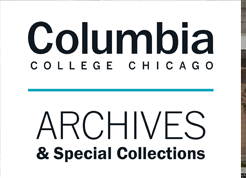Document Type
Article
Loading...
Publication Date
Spring 2010
Keywords
Zimbabwe African National Union, Chicago Teachers Union, Chicago Public Schools, Vietnam War, El Salvador, University of Chicago, Fort Carson (Colo.), Substitutes United for Better Schools, Chicago Area Mililtary Project, Vietnam Veterans Against the War, Augusto Pinochet Ugarte, South Africa Military Refugee Aid Fund, Prexy Nesbitt, Don Morton, African National Congress, Nelson Mandela, David Zeiger, Arne Duncan, Larry McDonald, Connie Day, Lou Pyster, Jacqueline Vaughn, Jarvis Williams, Service Employees International Union, Andy Stern, Mozambique, Angola, Ronald Reagan, New York Stonewall Riots, Thomas Lanigan Schmidt, Barack Obama, Jackie Robinson, Chicago Teachers Pension Fund, Robben Island (South Africa), National Socialist Party of America, Romania, Naomi Klein
Disciplines
African History | Education | Labor History | Oral History | Political History | Political Science | Political Theory | Race and Ethnicity | Race, Ethnicity and Post-Colonial Studies | United States History | Work, Economy and Organizations
Abstract
Length: 154 minutes
Oral history interview of George Schmidt by Melena Grace Nicholson
Chicago Public School teacher and union activist, George Schmidt discusses his work as editor of Substance a newspaper covering public education that he helped found in 1975. His activism was sparked during his college years and he recounts his work during his teaching career. He was involved in the G.I. movement and military counseling, working with ZANU (Zimbabwe African National Union), and people in Angola and Mozambique, before becoming a teacher. His interest in military counseling and the G.I. movement stems from his own parents’ experience during World War II, where his mother, a nurse, served in Okinawa and his father served in the army, stationed in Europe. His mother returned to the states suffering from what is known as PTSD. Through his GI movement work is where he learned the business of publishing newspapers. During his Chicago Public School teacher career, he recounts establishing the newspaper Substance, and its impact in Chicago and on Chicago education.
Recommended Citation
Nicholson, Melena Grace. "Interview with George Schmidt" (Spring 2010). Oral Histories, Chicago Anti-Apartheid Collection, College Archives & Special Collections, Columbia College Chicago. http://digitalcommons.colum.edu/cadc_caam_oralhistories/15
Creative Commons License

This work is licensed under a Creative Commons Attribution-NonCommercial-No Derivative Works 4.0 International License.
Included in
African History Commons, Education Commons, Labor History Commons, Oral History Commons, Political History Commons, Political Theory Commons, Race and Ethnicity Commons, Race, Ethnicity and Post-Colonial Studies Commons, United States History Commons, Work, Economy and Organizations Commons



Biography and Comments
George Schmidt was born and raised in New Jersey. The oldest of four children, he moved to Chicago in 1964 to attend college at University of Chicago, graduating with a degree in English and Humanities. He worked with soldiers, organizing against the Vietnam War during the 1960s and with African organizations and people in the anti-imperialist movement in the 1970s, primarily through the publication of underground newspapers. Those who had been part of the anti-war movement and the GI movement, including him, worked with SAMRAF, South Africa Military Refugee Aid Fund. He then taught English in Chicago Public Schools and was active in the Chicago Teachers Union. In 1975 he helped found Substance, a newspaper whose name derives from SUBS: Substitutes United for Better Schools.
The interviewer conducted this oral history as part of his/her coursework for the Spring 2010 class, Oral History: The Art of the Interview. This interview supports the scope and content of the Chicago Anti-Apartheid Movement Collection at the College Archives & Special Collections department of Columbia College Chicago. Contact archives@colum.edu for more information and to view the collection.